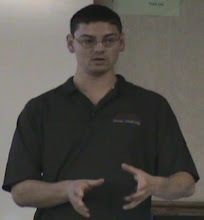Given this exponential growth, it wasn't too surprising that I ran into size constraints quickly when working on Cove. For the following example I did a simple case of putting the entire register in superposition, then measuring it. This was done on an Intel Core Duo T2300 with 1 GB of RAM maybe a year and a half ago. The jump between 9 and 10 qubits really illistrates how the exponential slow down happens in a simulation of an arbitrary quantum system.


No comments:
Post a Comment